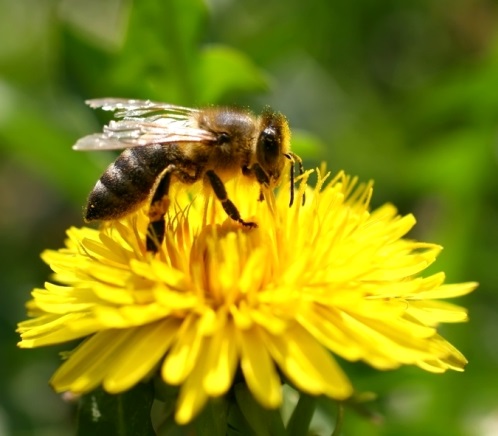From the report “Weeds for bees? A review“, of Vincent Bretagnolle and Sabrina Gaba, published at Agronomy for Sustainable Development
There is clear evidence that agricultural intensification has led to the loss of biodiversity, a decline in landscape diversity with the disappearance of semi-natural elements of all types, and ultimately a reduction in ecosystem functioning. Loss of biodiversity does not simply alter ecosystems per se, it also results in the partial or complete loss of services provided to humans by these ecosystems.
Agricultural intensification has led to the decrease of the diversity of wild and domestic pollinators. For instance, honeybees declined by 59 % in 61 years in the USA. About 35 % of major crops in the world depend on pollination services, and 3–8 % of world crop production will disappear without pollinators. Indeed, pollination provides several ecosystem services such as enabling crop and honey productions, regulating weeds and other cultural services.

Agricultural intensification has also decreased weed diversity by about 50 % in 70 years because massive herbicide sprays have reduced the competition between weeds and crops. Nevertheless, weeds are at the basis of agricultural foodwebs, providing food to many living organisms. In particular, weeds provide flowers for pollinating insects including honey and wild bees.
The report reviews the decline of weeds and bees, and discuss the effect of bees and pollination on crop production. It is described the complex interactions between bee pollinators, e.g. honey and wild bees, and landscape habitats such as crop fields and semi-natural elements.
For that, the report focus on spatial and temporal effects on flower resources, and shows that weed abundance can reduce crop yields, thus inducing conflict with farmers. But weed abundance enhances regulating services by ensuring the survival of honeybees in the absence of oil seed crops. Weed abundance also enhances pollination services and, in turn, honey yield for the benefit of beekeepers.
Weed abundance has also improved the survival of wild flora and the socio-cultural value of landscapes, a major request from the public. From those findings, the report presents a conceptual framework allowing to define ecological engineering options based upon ecosystem services of weeds and pollinators.

